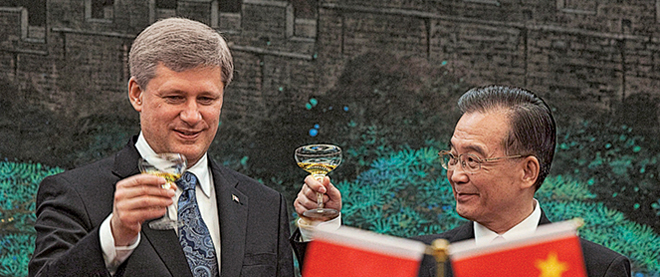Living in a world without leaders
‘Diplomacy, like a lot of other things Harper used to regard with suspicion, is back in style.’
Prime Minister Stephen Harper takes part in a toast with Wen Jiabao, Premier of the Peolpe’s Republic of China, following a signing ceremony at the Great Hall of the People in Beijing, China on Thursday, December 3, 2009. THE CANADIAN PRESS/Sean Kilpatrick
Share

In his first speech in the House of Commons as leader of the Opposition, in 2002, Stephen Harper’s chosen topic was “perhaps the most important issue that ever faces Canada: our relationship with the United States.”
Harper was pretty sure the Liberals were making a mess of that relationship. Jean Chrétien didn’t really even like Americans, so he was frittering away time on trade trips to China in a doomed attempt “to revive the failed trade diversification of the 1970s, the Trudeau government’s so-called third-option strategy, which did not work then and is not working now.”
On the matter of Canada-U.S. relations, as on almost no other topic, Harper admitted nostalgia for the days of Brian Mulroney. Now there was a guy who “understood a fundamental truth,” said Harper: “The United States is our closest neighbour, our best ally, our biggest customer and our most consistent friend. Whatever else, we forget these things at our own peril.”
Today Harper and Barack Obama share a sort of blandly pleasant mutual incomprehension, and Harper went to Davos to say he’s making trade diversification, “beyond the United States and specifically to Asia,” a “national priority.” It’s one of the biggest foreign-policy reversals of Harper’s life. Has he forgotten Mulroney’s “fundamental truth?” Is Obama such a dud that proper Canada-U.S. relations can’t work?
There’s a third possibility: that the world is changing in ways that make it important for Canada to look past the U.S. That’s the diagnosis Columbia University political scientist Ian Bremmer lays out in his book Every Nation for Itself: Winners and Losers in a G-Zero World.
Bremmer offers a variation on a familiar theme, a decline in the ability of the United States to set anyone’s global agenda—on the economy, on security, or on the fight against climate change, if there still is such a thing. The “G-Zero” is Bremmer’s name for a world in which “no single country or durable alliance of countries can meet the challenges of global leadership.”
This wasn’t even a new idea when Fareed Zakaria wrote The Post-American World in 2008, but the notion of a non-omnipotent America was still fresh enough that a photo of Obama carrying Zakaria’s book on the campaign trail helped feed Republican claims that Obama is a fifth columnist plotting to undermine his current country of residence.
Bremmer claims one difference with Zakaria: he doesn’t think Zakaria’s term “the rise of the rest” properly describes the new world disorder. To Bremmer, there is no coherent “rest.” “For the first time in seven decades, we live in a world without global leadership,” he writes. The U.S. is hobbled by “endless partisan combat and mounting federal debt.” Nasty surprises in Iraq and Afghanistan have left the Americans much less interested in playing global cop. Japan is recovering more quickly from a tsunami than from “two decades of political and economic malaise.” China’s not ready for leadership yet, which may turn out to have been a blessing.
Meanwhile, pick your preferred global power structure—the United Nations, the European Union, NATO, G7, G8, G20—they’re all experiencing crises of legitimacy or efficacy. Bremmer’s book opens with an argument he had with Paul Martin over the G20. Bremmer gives Harper’s predecessor high marks for diagnosis. The G7 is, as Martin saw, “an increasingly irrelevant institution.” But adding enough developing countries to make a G20 leaves “too little common ground for substantive progress” except in a crisis. So the G20 seemed like a splendid idea for a few months at the end of 2008, and now it doesn’t work either.
Bremmer’s book is written in the U.S. for a global audience, so only in the wonkiest corners of Canada will it be read as a book-length paraphrase of Harper’s “sea of troubles” speech from the 2011 election campaign. With all the “disaster in the Pacific, chaos in the Middle East, debt problems in Europe, and all kinds of challenges south of our border,” the Conservative leader said at every stop, “Canada is the closest thing the world has to an island of stability and security.”
Indeed, Bremmer includes Canada in a list of countries that stand to benefit in a world without global leadership, because they have “more options and greater influence.” Most of Bremmer’s so-called “pivot states” are developing countries: Brazil, Turkey, Indonesia, Japan, much of Africa. Canada makes the list too, less dependent on the U.S. than Mexico because our exports to countries other than the U.S. rose from 18 per cent to 25 per cent of total exports from 2005 to 2009. But our commercial independence from the U.S. has been growing for years. “Canada was working to build commercial ties with Asia for years before the recession took hold in the United States,” Bremmer notes.
During much of that time Harper was ambivalent or, when he was in Opposition, openly hostile to the notion of building commercial ties with China. Now Bremmer has more advice for the Prime Minister. “Canada should not [only] be pivoting to China,” he told me in a telephone interview. “They should be pivoting to everyone.” In a world with so many variables driving up uncertainty, this is a lousy time for governments to be dealing with only a small number of foreign interlocutors. Robust diplomacy, like a lot of other things Harper used to regard with suspicion, just came back in style. “If you’re Canada right now,” Bremmer said, “you want to be doubling down on your international capacity and exposure.”